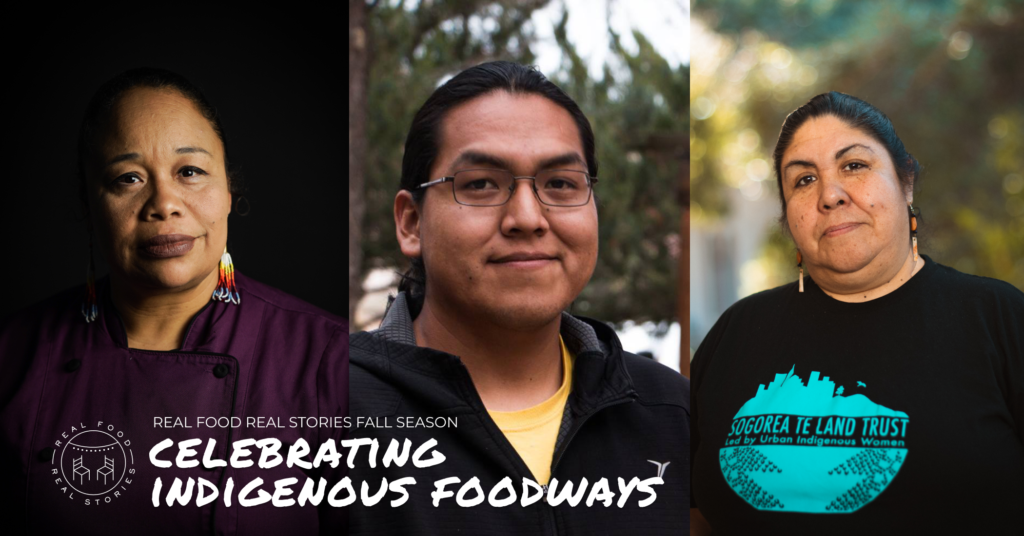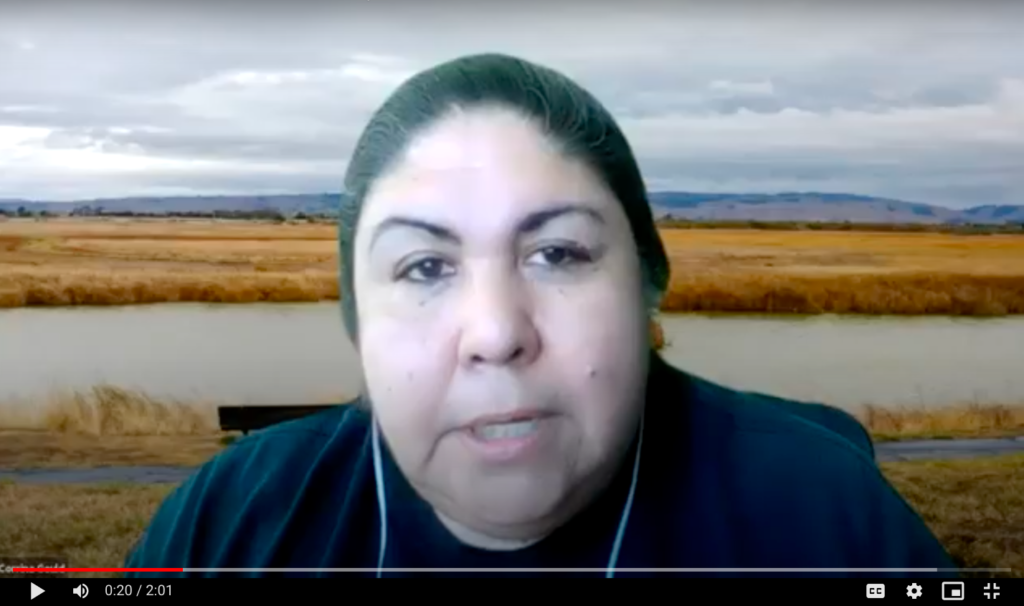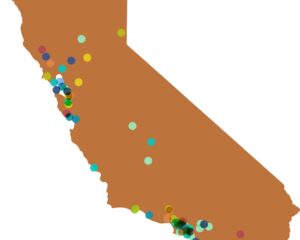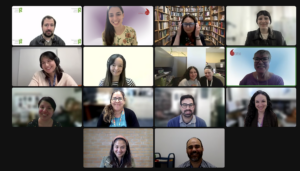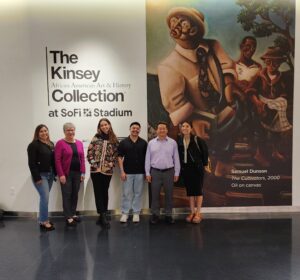“To invite people into exploring their own lineages and consider what it means to belong to the land that feeds us, it felt essential to center the stories of the Indigenous communities that originally stewarded––and continue to care for––our shared home.” – Jovida Ross, Executive Director, Food Culture Collective
2020 Celebrating Indigenous Foodways storytelling series celebrates the vision and powerful stories of Indigenous food leaders, making possible a future in which we can all flourish. Supported by a Humanities for All Quick grant, the project’s organization, Real Food Stories, recently changed its name to Food Culture Collective. To share a deeper insight into how the project highlights Indigenous changemakers’ personal stories of reclaiming their ancestral traditions and their work to reconnect with culturally rooted, ecologically responsible practices, we asked project director Jovida Ross to tell us more about her inspiration, the speakers, and their perspectives.
- Can you tell us about the inspiration for your project, “Celebrating and Supporting Indigenous Foodways”?
Over several years of facilitating storytelling workshops and events with farmers, organizers, healers, foodmakers, chefs, and creatives in food, we noticed a common theme: people reconnecting with their ancestral food practices and renewing their relationships with the land. We particularly heard this from people living in diasporic immigrant communities in California. Several named this reclamation as a way to counter the destructive impacts of colonization and labor exploitation and the ongoing ways these forces define our relationships with ourselves, each other, and our broader world. So, we began to pay more attention to these themes in our work. To invite people to explore their own lineages and consider what it means to belong to the land that feeds us, it felt essential to center the stories of the Indigenous communities that originally stewarded––and continue to care for––our shared home.
- Who were the speakers and partners that collaborated on this project?
We heard from three Indigenous leaders who are revitalizing their ancestral food traditions: Corrina Gould (Chochenyo and Karkin Ohlone) of Sogorea Te’ Land Trust, Burrel Jones (Navajo) of Tolani Lake Enterprises, and Chef Crystal Wahpepah (Kickapoo) of Wahpepah’s Kitchen. The storytellers each shared the story of their relationship with culturally rooted food practices and how it informs their food work and leadership today. In addition, the Sogorea Te’ Land Trust team gave us feedback on the content we developed for social media to support and uplift the series’ themes. We also partnered with the Native American Health Center in the Bay Area to spread the word about the live story gatherings.
- How did their perspectives and experiences shape this series, and why does their work matter?
Each story offered a glimpse into the vibrancy of cultural practices based on seasonal nourishment, reciprocal relationships, and stewardship of land and water for mutual benefit. Chef Crystal Wahpepah shared how cooking and keeping her Indigenous Kickapoo food traditions alive has been essential to her personal healing journey and how sharing her food with others has been equally healing for her community. Burrell Jones shared his work with Navajo young people, building a regenerative local economy through cultural knowledge of regenerative farming techniques. Lastly, Corrina Gould shared how she’s fought to raise awareness that she and her people are a part of a living, breathing Ohlone culture that has been on the land for thousands of years. Corrina is particularly guided by a vision of rematriation: facilitating the return of Indigenous land to Indigenous people to support deeper healing.
- Drawing on the insights shared by the speakers in this series, are there ways we can incorporate sustainable food practices in our communities?
These cultural food projects are not just about preserving traditional foodways; by resurfacing a relationship to food that celebrates sovereignty and reciprocity, we expand our capacity to dream into liberatory imaginations of the future. And when we understand food as culture, it becomes clear that we all shape and create food culture. Once we recognize this, we can begin to (re)claim our power to truly nourish ourselves and our communities; to be intentional about what culture we feed through our everyday choices and interactions. Each story in this series reached beyond a conversation of “fixing the broken food system” to focus on healing from harmful, dominant norms of how we grow, cook, and gather around food. Only by shifting the values that underpin our relationships to food and land can we supplant the extraction and exploitation baked into our food system, to instead center care and reciprocity.
- Can you share a recipe or food tradition that is important to you?
A year after this series, we heard from another Indigenous leader, Mohawk seedkeeper Rowen White. She reminded us that we all descend from people who’ve had intimate and reciprocal relationships with plants and seeds since the dawn of time and that reclaiming these lineages is essential work for each of us. Rowen offered that the seeds of our ancestral wisdom are just waiting to be “rehydrated.” She told us, “Whether it’s seeds, or food, in the kitchen, or art, or poetry, or whatever is your passion: you had ancestors that did that too… it’s the way that you stitch yourself back into that culture.” So, I’ve been exploring the smells and flavors that make me feel joyful and alive. One example: I’ve been enjoying kasha, or whole-grain cereal, which my ancestors ate. I’ve been using oat groats, which are chewy, a little nutty, and a little sweet—delicious!
In this video clip, Corrina Gould of Sogorea Te’ Land Trust shares a Food Story. The transcription is below:
So I work with Caleen Sisk, who is the chief of the Winnemem Wintu, to do a salmon walk and run and prayer for four years, to bring those salmon back home to where they need to be. Not just for the salmon, but for all of us. So, there’s ceremonies that happen in our territories that need to happen that don’t just work for us, but they work for everybody that now lives in our territories. You see, salmon has a relationship with the California Native people and other tribes that––that have a relationship with them. The relationship isn’t just about the bounty of them, so we can eat them, but that the health of the salmon is there, makes it healthier for all of us to be on the land. There’s a circle of relationships that happen in our territories that people have forgotten about, about how do we live in reciprocity and that we don’t take as much more than we need.
Today, when I look around my neighborhoods, my territories, it’s all got asphalt and concrete and buildings, things that are not gonna be here for a long time, things that will not survive thousands of years like our Shellmounds did. Our ceremonies that need to take place, and our lands need to have been in reciprocity with the people now that live on our territory.
We can’t do this work alone. It’s been because we’ve had allies and accomplices that have worked with us, that have really put our name up there so that people realize that we’re not dead anymore, that we are living culture, and that we still have responsibilities to this land. And, when we are able to take care of our responsibilities as hosts on our land, and we have good guests working with us, then we’re able to do our job better.

